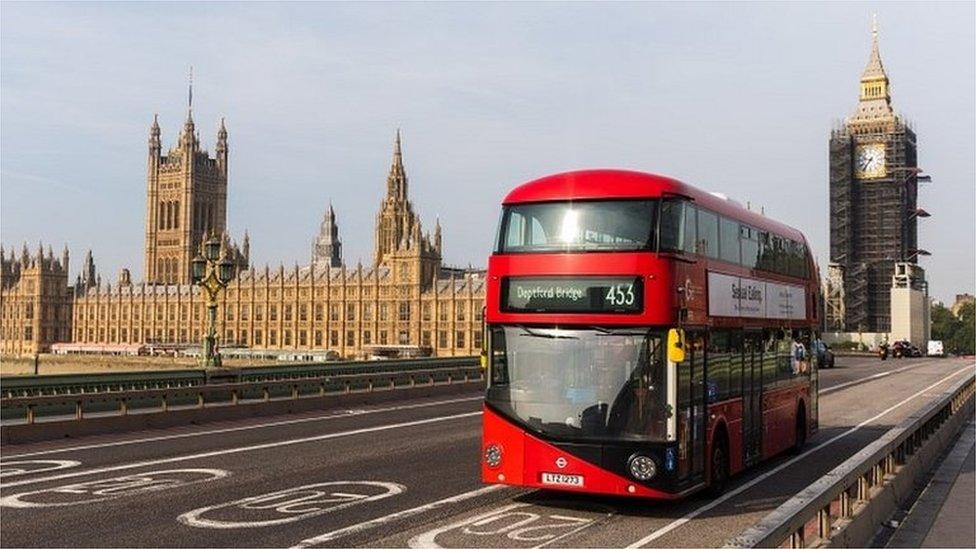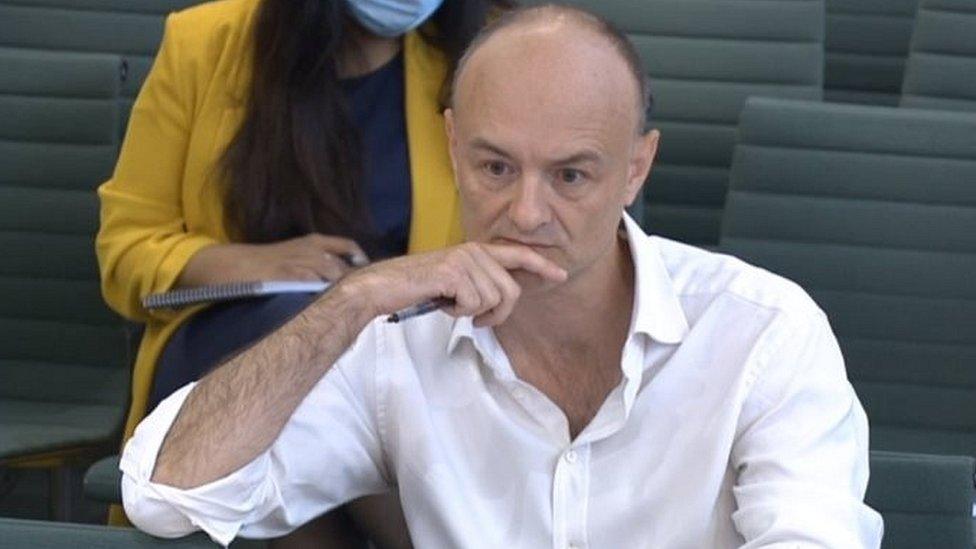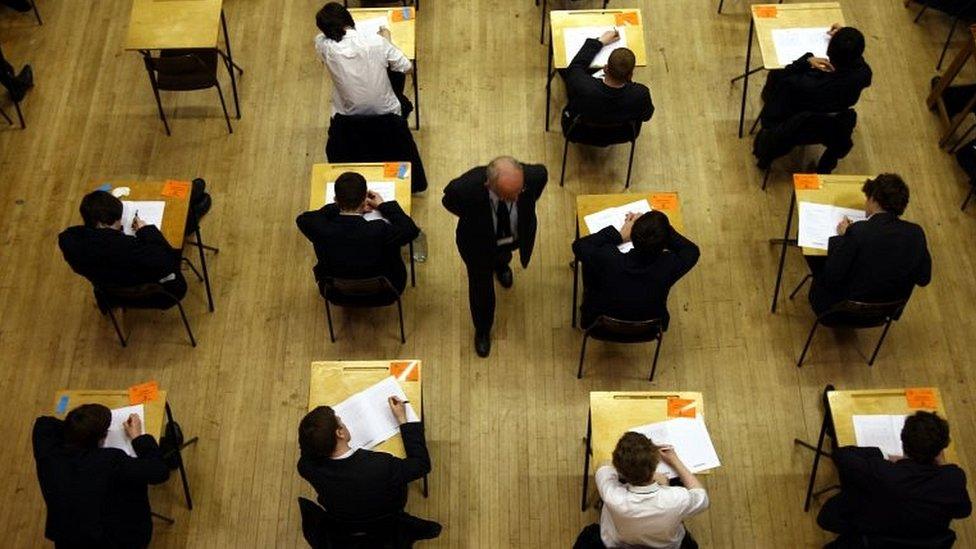The week ahead in Parliament
- Published

While MPs take a further week to recover from their conference exertions, peers are back in business, with a clash with the Commons looming over universal credit.
Some peers are seeking a way to force MPs to vote on the end of the £20-a-week pandemic uplift to the benefit, which happened automatically, without any Commons vote.
Leading the charge is the Conservative Baroness Stroud, a former special advisor to Sir Iain Duncan Smith, when he introduced universal credit as work and pensions secretary.
But any such move risks violating the powerful constitutional taboo which keeps the Lords out of money issues, and could provoke the government into trying to limit the powers of the Upper House.
The only way a Commons vote could be engineered would be to amend legislation, and on Wednesday, there's the Second Reading of the Social Security (Uprating of Benefits) Bill, the annual legislation to revalue an assortment of benefits, which this year included the shelving of the government's "triple lock" on the value of the state pension.
Grounds for failure?
When it was before the Commons, Sir Ian tabled a "reasoned amendment" to decline a second reading to the bill.
His revolt fizzled when the amendment wasn't selected for debate by Speaker Hoyle, but in the Lords, Lady Stroud seems to be gearing up to reprocess that amendment into something which could then be put to the vote at report stage - when, potentially, it might be passed on the eve of Rishi Sunak's Budget, throwing a multi-billion-pound spanner into the chancellor's plans.
There are plenty of ways the gambit could fail; it might flounder on technical grounds, or on hard politics. For a start, it would need the support of a wide coalition - the main opposition groupings, Labour and the Lib Dems, plus the two Greens, a fair helping of crossbenchers, and some Tory rebels.
Each may be wary for different reasons. Labour may not be keen to set a precedent for Lords interference in the Commons' sole right to decide on issues of taxation and spending, for fear that it would be used against a future Labour government, and may also doubt that enough Conservative MPs would be prepared to rebel and vote to keep the uplift.
But on the other hand they will see some value in forcing "red wall" Tories to vote for the cut - or rebel. And the question of whether this would be a proper step for the unelected House to take will weigh on many crossbenchers.

What will an MPs' report have to say about Dominic Cummings?
And then there's the inevitable government backlash - many peers remember the October 2015 vote which blocked the then Chancellor George Osborne's plans to cut tax credits to poorer families, a move which triggered a rather menacing review into curbing their powers, by former Leader of the Lords, Lord Strathclyde.
The government might want to dust off the Strathclyde review - but may well not have the time or political capital to spend on pushing serious Lords reform through Parliament.
There could also be government statements on issues which have cropped up over the recess period, although these are normally reserved to more, senior ministers sitting in the Commons. But the opposition could always put down private notice questions, the Lords equivalent of the Commons' urgent questions.
Outside the debating chambers, what may (or may not) turn out to be the major Westminster event of the week is the publication of the Health and Social Care and Science and Technology select committees' long-awaited joint report on Coronavirus: Lessons Learned to Date - published at one minute past midnight.
This is the product of the marathon inquiry which included that remarkable seven-hour evidence session with the prime minister's former adviser, Dominic Cummings, in which he fired off a series of blistering allegations against his former master and the then Health Secretary, Matt Hancock.
If no documentary evidence has been provided to underpin his claims, expect some pretty withering comment on Mr Cummings.
Away from the political infighting and blame games, the inquiry covered six key areas of the response to the pandemic:
The country's preparedness for such an event (remember, co-chair Jeremy Hunt was the health secretary for much of the period when preparations were being made)
The use of border controls, social distancing and lockdowns
The use of test, trace and isolate strategies
The impact on social care
The impact on specific communities
The procurement and roll-out of vaccines
The bland language of the inquiry's terms of reference can't conceal the political sensitivity of the this subject matter, and the long process of drafting the report suggests that. behind closed doors, there has been a great deal of argument.
So it will be worth checking the formal minutes of the committee, normally found at the back of the report, to see if there were votes, for example, on the precise wording of particular recommendations and comments.
Here's my rundown of the week ahead:
Monday 11 October
Peers return to their chamber (14:30) for 40 minutes of questions to ministers. The first is on the Home Office hiring the Black Dog crisis management company in March 2020 to deliver a "debriefing exercise" with staff in the department, at a cost of £16,000. The question comes from the Labour peer, Baroness Chakrabarti.
The main legislative event is consideration of the Health and Social Care Levy Bill - the measure which increases National Insurance to meet the NHS's pandemic backlog and fund social care in the future. Because this is a Money Bill peers normally yomp through the second reading and remaining stages of consideration in a single sitting - although probably with a few grumbles about the policy.
Tuesday 12 October

Ministers will be quizzed on lessons learned about exams
Even before the Lords open for business, watch out for the publication of the Health and Social Care and Science and Technology select committees' joint report on Coronavirus: Lessons Learned.
When peers spring into action (14:30) questions to ministers range across the credibility and integrity of the assessment processes in schools for this summer's A-levels and GCSEs, to making virginity testing illegal.
The day's legislating includes the first day of report-stage consideration of the Skills and Post-16 Education Bill. The main issues are the equivalence to lower qualification rule, putting a commitment lifelong skill training on the face of the bill, HE defunding, and criminalising so-called "essay mills" or, as it describes them "cheating services," and making it a crime to advertise such services.
Expect some detailed issues to be forced to a vote.
There's also a regret motion against a statutory instrument, the Regulation of Investigatory Powers (Criminal Conduct Authorisations) (Amendment) Order 2021 which deals with the authorisation of covert human intelligence sources to take part in criminal activity, allowing, for example, sources in criminal gangs to commit offences to maintain their cover.
This follows new legislation to regularise authorisations in what remains a highly controversial area. The regret motion comes from the former Lord Speaker, Baroness D'Souza
Committee action includes the Lords Built Environment Committee (10:00) looking at meeting the UK's housing demand.
The Communications and Digital Committee (14:15) ponders the future - and possible privatisation of Channel 4, with witnesses including its former chief executive Lord Grade of Yarmouth, former chair Luke Johnson, then current chief executive Alex Mahon and current chair Charles Gurassa.
Wednesday 13 October
Peers open (15:00) with questions on the rising costs of wholesale energy prices and their impact on household electricity bills and support for the fashion industry.
That's followed by the second reading of the Social Security (Uprating of Benefits) Bill, which does what it says on the tin (see above). However it manifests itself, the key issue is the suspension of the Government's triple-lock pensions commitment.
Then, environment minister Lord Goldsmith of Richmond Park conducts the final approval of the much-amended Environment Bill. This is the third reading stage of consideration, which is normally a perfunctory rubber-stamping exercise, but may, on this occasion, see the government offer a few concessions
Finally, there's the second reading of a highly technical piece of financial services legislation, the Critical Benchmarks (References and Administrators' Liability) Bill. This aims to reduce the scope for uncertainty and litigation following the withdrawal of Libor, a key interest rate used as a "benchmark" in the UK financial system to work out amounts payable in contracts.

The state of the UK's rivers has become a cause for political concern
The Commons Environmental Audit Committee (14:25) quizzes water company executives about water quality in rivers - and the impact of sewage-dumping.
And the Lords Public Services Committee (15:00) hears from Dame Rachel de Souza, the Children's Commissioner for England, about the role of public services in addressing child vulnerability.
Thursday 14 October
Peers open (11:00) with a question on granting visas to Iraqi interpreters who worked with British armed forces.
And Labour's Admiral Lord West of Spithead asks about government orders for promised new ships for the Royal Navy.
The main debates are on issues chosen by Labour backbenchers. First, Baroness Pitkeathley leads on social care, focussing on addressing the current crisis as well as long-term funding, with new health minister Lord Kamal debuting in response.
The second is on producing a long-term regional strategy to tackle inequalities within England and the UK, led by Lord Liddle
Between these, there's an hour-long topical debate, led by the Bishop of St Albans, on the government's assessment of the Public Health England report on gambling-related harms
Finally there's a take-note motion on the Free Trade Agreement between Iceland, the Principality of Liechtenstein, the Kingdom of Norway and the UK.
The Joint Committee on the Draft Online Safety Bill (09:45) chaired by Damian Collins MP, quizzes expert witnesses and the environment minister Lord Goldsmith appears before the Environment and Climate Change Committee (10:00) to talk about the COP26 conference.
Friday 15 October
The House of Lords is not expected to sit.
